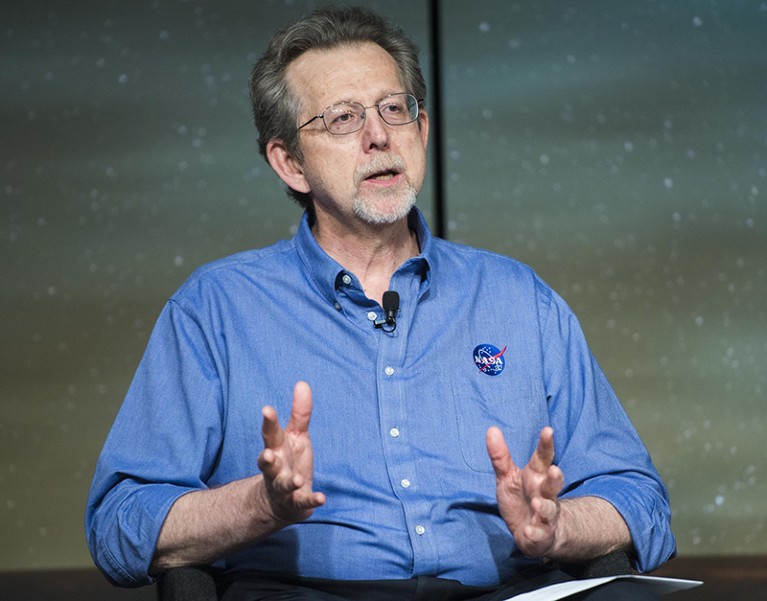EVENTS
March for Science back for round two Supporters of science around the world took to the streets on 14 April for the second annual March for Science. Although more than 1 million people attended the 2017 events, the turnout this year was significantly smaller at many sites. Organizers say they held more than 250 marches, festivals and other events this year, compared with the more than 600 demonstrations that took place last year. Among the cities holding demonstrations were Washington DC (pictured), Mumbai, Mexico City and Frankfurt — with many marchers turning out to call for increased research funding and to defend scientific values.

Hundreds of people joined the March for Science on the National Mall in Washington DC on 14 April.Credit: Marvin Joseph/The Washington Post/Getty
Spy-poison probe The international chemical-weapons watchdog has agreed with UK findings about the identity of the poison used in an attempted assassination of a former Russian spy in Britain. The Organisation for the Prohibition of Chemical Weapons (OPCW) carried out independent tests of samples from the town of Salisbury, where Sergei Skripal and his daughter Yulia were found poisoned in March. The OPCW has for now shared the name and the structure of the substance only with states party to the 1997 convention that bans the production or use of chemical weapons. Scientists with Britain’s national defence laboratory at Porton Down say the compound belongs to a class of nerve agents called Novichoks.
Spanish petition Leading Spanish scientific organizations delivered a petition signed by more than 277,000 people to the national parliament in Madrid on 11 April, calling on the government to stop the “progressive abandonment of science in Spain”.
UNIVERSITIES
UK strikes off A strike over pensions changes that would have affected tens of thousands of UK academics was suspended on 13 April, after union members voted to accept a deal from their employers. Staff at 65 universities walked out for a total of 14 days in February and March over changes that would have seen their pension income go from having a guaranteed element to being entirely dependent on investment return, leaving them worse off in retirement. Universities UK, which represents the employers, said the changes were needed to address a deficit in the pension fund. University and College Union (UCU) members last month rejected an initial offer to resolve the dispute. But nearly two-thirds of voting members approved the second proposal, which commits to maintaining a guaranteed pension element. The plan would also create a joint panel to re-examine the pension scheme’s valuation, which many academics say was inaccurate. The board of the pension scheme and the UK Pensions Regulator must now approve the proposal.
HEALTH
Flesh-eating illness Australian scientists are calling for urgent scientific efforts to understand a worsening outbreak of Buruli ulcer, an infectious disease caused by a flesh-eating bacterium. In a 16 April letter in the Medical Journal of Australia, researchers report 236 new cases in the state of Victoria from 1 January to 11 November 2017, compared with 156 from the same period in 2016 (D. P. O’Brien et al. Med. J. Aust. 208, 287–289; 2018). Roughly 2,000 cases of the disease, which is caused by Mycobacterium ulcerans, are reported worldwide each year, mostly in West and Central Africa. The letter’s four authors call for increased funding to investigate the environmental factors that assist the bacterium’s growth, how it spreads to humans and why it is becoming more prevalent in Victoria. Mosquitoes, other insects and possums are considered possible vectors.
AI diagnostic tool On 11 April, the US Food and Drug Administration gave the green light to a medical device that uses artificial intelligence (AI) to detect diabetic retinopathy — a leading cause of blindness among people with diabetes in the United States. The agency says the device is the first AI tool it has approved that screens for disease without the need for a clinician to analyse the results. This makes the device suitable for use by health workers who are not eye-care specialists. It was developed by IDx, an AI company in Coralville, Iowa, and a clinical study found that it correctly identified people with diabetic retinopathy 87% of the time.
PEOPLE
NASA science chief Planetary scientist Jim Green is NASA’s new chief scientist, the agency announced on 10 April. Green (pictured) has run NASA’s planetary-sciences division since 2006, overseeing projects including three Mars rovers and the New Horizons missions to Pluto. NASA has not had a permanent chief scientist since geologist Ellen Stofan left in 2016. Stofan will become director of the Smithsonian Institution’s National Air and Space Museum in Washington DC on 30 April.

Jim Green, NASA’s new chief scientist. Credit: Joel Kowsky/NASA
Protein-fraud ban An academic behind one of the most extensive cases of fraud uncovered in protein crystallography has received a ten-year government funding ban in the United States. On 10 April, the US Office of Research Integrity (ORI) said that H. M. Krishna Murthy, formerly an associate professor at the University of Alabama at Birmingham, had “falsified and/or fabricated” data in 12 entries in a protein-structure database and in 9 research articles, including one published in Nature in 2006. The fraudulent research was supported by six grants from the US National Institutes of Health. In 2009, the University of Alabama at Birmingham reported the results of a two-year investigation into the case, and the ORI agreed with the findings. Murthy disputed the ORI’s conclusions but a judge has now rejected his appeal. The judge’s decision document details Murthy’s defences, which include that he had made honest mistakes and that similar errors are common in research.
ENVIRONMENT
Polish logging The European Court of Justice ruled on 17 April that Poland broke European Union wildlife laws by allowing increased logging in the country’s ancient Białowieża forest. Polish authorities had in 2016 tripled logging limits to fight a pest outbreak in the forest, home to the largest population of European bison and a variety of rare birds and insects. Environmental groups filed a complaint with the European Commission, which referred the case to the EU’s highest court. In July last year, the court ordered a preliminary ban on tree felling in the forest; despite fierce protests by campaigners, logging continued throughout the summer and autumn. The government said in December that it would comply with any ruling. After a government reshuffle, Poland’s new environment minister suspended most logging in January, pending the court’s final decision.
Pollution plan More than 170 countries have agreed on a plan aimed at reducing greenhouse-gas emissions from the shipping industry, the United Nations International Maritime Organization (IMO) said on 13 April. The agreement calls for at least a 50% reduction in carbon emissions by 2050 compared with 2008 levels, with a long-term goal of phasing such pollution out completely. The IMO plans to flesh out and finalize a regulatory framework by 2023. Emissions-reduction strategies under consideration include strengthening and extending energy-efficiency regulations that the IMO adopted in 2011, mandating cleaner fuels or new engine technologies, or imposing lower speed limits on ships in international waters to reduce fuel use.
TED awards Efforts to explore the ocean’s ‘twilight zone’ and launch a methane-monitoring satellite have won support from the Audacious Project, a philanthropy programme run by the non-profit group TED in New York City. On 11 April, the group announced that it has given US$35 million to the Woods Hole Oceanographic Institution in Massachusetts to develop advanced robotic vehicles that can explore the area 200–1,000 metres below the ocean surface — an area where sunlight fades but life thrives. The Environmental Defense Fund, an advocacy group in New York City, will receive an unspecified amount in the tens of millions of dollars to develop a satellite that can monitor methane emissions from oil and gas fields.
BUSINESS
Publisher listing Academic publisher Springer Nature has announced its intention to raise €1.2 billion (US$1.5 billion) from selling new shares in an initial public offering on the Frankfurt stock exchange. Springer Nature, which publishes this journal and more than 3,000 others, was formed in 2015 in a merger between the London-based company Macmillan Science and Education and Berlin-based publisher Springer Science+Business Media. In 2017, Springer Nature posted revenues of €1.64 billion. Private German company Holtzbrinck Publishing Group, which owns 53% of Springer Nature, is planning to hold on to its stake. A large portion of the listing proceeds will be used to cut the company’s debt, said a company spokesperson. (Nature’s news team is editorially independent of its publisher.)
TREND WATCH
The main pot of research funding given to English universities according to a nationwide quality evaluation known as the Research Excellence Framework (REF) will remain flat in 2018–19, although UK research funding more widely will rise. English universities will receive a total of £1.05 billion (US$1.50 billion) in ‘quality-related’ funding to spend as they wish, the same as for the previous 2 years. But thanks to a funding boost announced in 2016, total cash for UK research is set to rise by 15%.

Source: Research England






